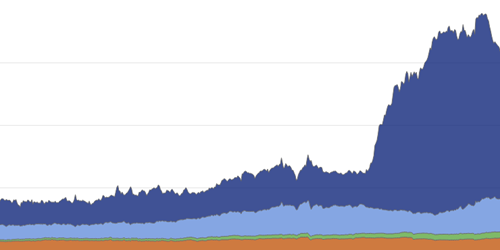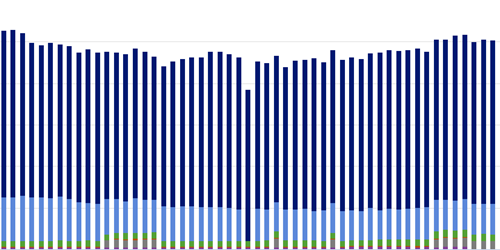Primary Dealer Failures To Deliver By Collateral Type
Collateral
Short-term funding markets often require that borrowers pledge securities as collateral against the possibility they may default on a loan. Types of collateral vary and can influence the rate of return charged for short-term funding and the willingness of lenders to extend such funding. The types of securities that appear as collateral can also indicate the security positions for which borrowers need financing. These charts present insights into the types of collateral used to secure funding across various short-term funding markets.
Primary dealer failures to deliver by collateral type
Aggregate failures to deliver securities for primary dealers broken out by type of collateral Mnemonics
Skip the ChartPrimary dealers serve as intermediaries in securities markets, receiving securities from sellers and delivering them to buyers. They also serve a unique role in purchasing Treasury securities at auction and acting as a counterparty to the Federal Reserve. In general, dealers have a limited time to deliver securities to settle any obligations to securities buyers. For a variety of reasons, dealers may be unable to meet these obligations—for instance, if they sell a security short that they do not own and are then unable to obtain the security for delivery. The unmet obligation to a buyer is recorded as a failure to deliver. The dealer may be subject to settlement charges as a result.
Failures to deliver are more common when there is underlying illiquidity in the securities market, which makes it more difficult for dealers to buy the securities they are obligated to deliver. High failures to deliver in an asset class may be a sign of underlying illiquidity in that asset
class. Failures can also cascade: one firm failing to deliver a security promised to another may cause the second firm to fail on obligations to a buyer. These cascading failures can exacerbate any lack of liquidity in the underlying security as dealers become more hesitant to buy and sell in markets where they face a greater chance of failures.
Series Used
This OFR monitor is presented solely for informative purposes and should not be relied upon for financial decisions; it is not intended to provide any investment or financial advice. If you have any specific questions about any financial or other matter please consult an appropriately qualified professional. The OFR makes no warranty, express or implied, nor assumes any legal liability or responsibility for the accuracy, completeness, reliability, and usefulness of any information that is available through this website, nor represents that its use would not infringe on any privately owned rights.
Disclaimer Regarding Non-OFR Data and InformationFor convenience and informational purposes only, the OFR may provide links and references to nongovernment sites. These sites may contain information that is copyrighted with restrictions on reuse. Permission to use copyrighted materials must be obtained from the original source and cannot be obtained from the OFR or from the U.S. Treasury Department. The OFR is not responsible for the content of external websites linked to or referenced from this site or from the OFR web server. The U.S. government, the U.S. Treasury Department, the Financial Stability Oversight Council, and the OFR neither endorse the data, information, content, materials, opinions, advice, statements, offers, products, services, presentation, or accuracy, nor make any warranty, express or implied, regarding these external websites. Please note that neither the U.S. Treasury Department nor the OFR controls, and cannot guarantee, the relevance, timeliness, or accuracy of third-party content or other materials. Users should be aware that when they select a link on this OFR website to an external website, they are leaving the OFR site.
Suggested CitationOffice of Financial Research, “OFR Short-term Funding Monitor,” refreshed daily, https://www.financialresearch.gov/short-term-funding-monitor/ (accessed ).





